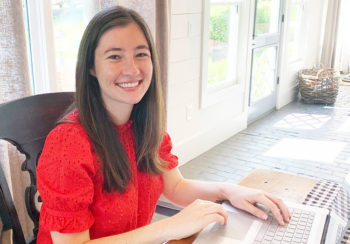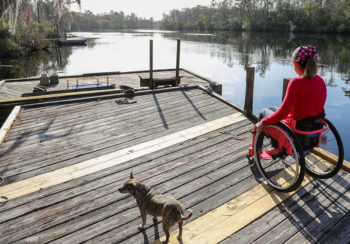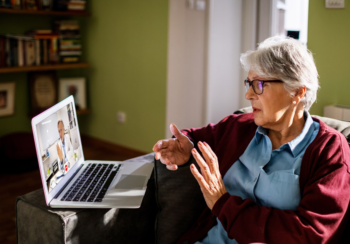New platform utilizes machine learning to customize interventions
Consistent findings reveal that veterans are passionate about helping other veterans and their families; however, these same veterans don’t always feel comfortable helping themselves, said University of Georgia researcher Brian Bauer, who has developed a platform that will enable vets to help each other.
Bauer was recently awarded $250,000 by Mission Daybreak, a part of the U.S. Department of Veteran Affairs’ 10-year strategy to end veteran suicide through a comprehensive, public health approach.
Formerly known as the Suicide Prevention Grand Challenge, Mission Daybreak offers $20 million in non-dilutive funding, as well as non-monetary resources that include data, research, mentorship, educational webinars and partnership opportunities. Bauer’s submission is led by himself and his former mentor Alex Leow, professor of psychiatry and bioengineering at the University of Illinois Chicago.
“We started with the idea that if we’re only focusing on people who were going through a crisis and are currently at high risk, we’re going to lose the battle of suicide prevention,” said Bauer, assistant professor in the Franklin College of Arts and Sciences department of psychology. “We also need to focus on assisting veterans and their family members build better lives to help prevent people from reaching high risk.”
Bauer’s submission is a platform called the Continued Service Network (CSN), and it has two components:
- A website that takes information from how users interact with the site, their electronic health records, their treatments, personality and values, and demographics to make personalized treatment recommendations. Users can filter by specific groups such as combat experience, branch or mental health professional so that veterans and their family members can select the sources they trust most.
- A smartphone app that allows users to integrate whatever they found useful from the website into their lives. “The app collects passive data such as the category of words you are typing. This can tell us if there is a sudden change in mood in real time,” said Bauer. The data then goes into machine learning algorithms that can help detect when a veteran might need intervention, what intervention would work best and what other similar users have found beneficial if the intervention didn’t work. “This algorithm gets better and better the more people use it – it optimizes over time.”
All that information is used to understand when people are distressed and when they need prompting to use the information they learned on the website. The app functions like a coach that helps them implement those lessons. The app can recommend problem solving skills, make argument de-escalation suggestions or connect the user with another person or chat bot if they need immediate help.
Importantly, on CSN, users can choose what data they are comfortable providing and are also offered walkthroughs about how their data are used.
“We want to build a technology platform, leveraging a new concept called computational democracy, to help veterans help one another and think better together,” said Leow.
Mission Daybreak consists of two phases. Bauer, Leow and the CSN team, along with 30 other teams, were selected from 1,371 submissions to receive the $250,000 prize offered to innovators through phase 1. During the second phase of the challenge, the 30 finalist teams will join an eight-week virtual accelerator, which will offer tailored support and resources as they advance their solutions.
Accelerator resources will include access to exclusive data sets, networking opportunities, mentorship and other tailored resources. After final submissions, finalists will present their refined solutions at Demo Day, a live pitch event in November 2022. Phase 2 will award $11.5 million in prizes: Two first-place winners will each receive $3 million, three second-place winners will each receive $1 million, and five third-place winners will each receive $500,000.






